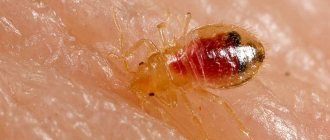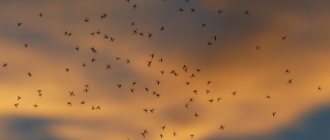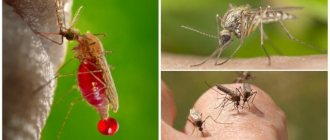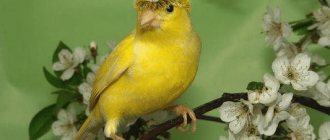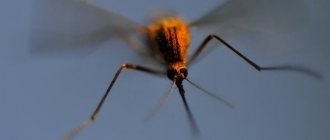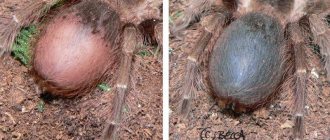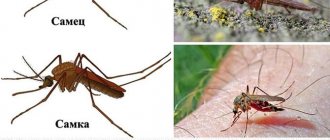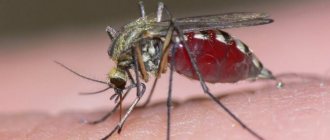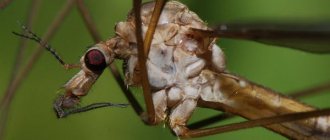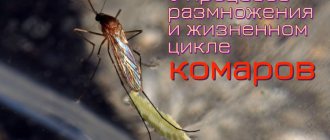(2 ratings, average: 4,50 out of 5)
It is a well-known fact that mosquitoes drink blood. That is why they are called bloodsuckers. They do not bring any benefit to either the person or the animal to which they are attached. But the point here is not only the insects’ own whim; they can do without it. So why do mosquitoes drink blood? The answer is simple - they need it to reproduce.
Why do mosquitoes drink blood?
To understand why mosquitoes drink blood, it is necessary to study the composition of lymph in detail. It necessarily contains proteins, without which females are unable to reproduce healthy offspring. As soon as the optimal amount of useful components accumulates in the insect’s body, it begins to form a clutch.
In the order Diptera there are many species that consume human “life-giving juice”. Some representatives of dipterans form clutches 1–2 times, others - from 3 to 5. The maximum number of clutches (about 11–12) during the period of existence was recorded in malaria mosquitoes. By the way, the research was carried out at a time when scientists were figuring out why an adult mosquito drinks blood.
Taking into account the research conducted by scientists, we can conclude why mosquitoes need blood. Mosquitoes consume human's favorite blood to replenish protein deficiency and produce healthy offspring. The number of eggs laid by a female is affected by both the volume and quality of lymph. This is why mosquitoes drink human blood.
No less interesting is why when a mosquito constantly sucks blood and does not suffocate. The main reason is the special structure of the oral apparatus and the location of the proboscis. By the way, entomologists distinguish insects on this basis.
Danger of mosquitoes
Mosquitoes are carriers of serious diseases: malaria, yellow fever, dengue and others. In tropical countries, 2,000,000 people die each year from malaria alone. There are no dangerous mosquitoes in the middle zone, but parasite bites cause a lot of trouble: itching, irritation, allergies.
But no matter how harmful mosquitoes are, you should not wish for their complete destruction. They are part of the food chain, because mosquito larvae are the source of food for many fish, including commercial fish. Although some scientists fear that numerous mosquito repellents will reduce the number of these bloodsuckers, their fears are unfounded. Insects obtain the bulk of blood from animals.
Who drinks, male or female?
To understand which sex needs blood, it is necessary to study the physiological characteristics and basic needs. Since only mosquitoes are involved in the formation of clutches, they also require protein from the lymph. Male mosquitoes do not feed on blood. They prefer plant juice or nectar from certain flowers. Males differ in the structure of their proboscis and mouthparts.
To understand whether squeaking mosquitoes can drink all the blood, it is necessary to study the mechanism. The insect has a constant need for protein, so mosquitoes suck blood until they are completely saturated with the bloody substance. The pest breaks away from the “healing source” after its abdomen is filled.
Diet
The basis of mosquito diet is sugar. Regardless of gender and age, bloodsuckers feed on honeydew, plant sugar, and in rare cases they eat nectar. And if these components are sufficient for a male, then the blood of an animal or human is necessary for a female.
To replenish their resources, mosquitoes have chosen certain types of plants:
- yarrow.
- Tansy.
- Burdock.
It is known that plant foods often attract young, unfertilized individuals.
Ectoparasitism helps the female, after mating, acquire a sufficient level of protein to lay eggs. An individual mosquito is able to determine the presence of a prey at a distance of about 3 km by emitted heat, the smell of sweat, and carbon dioxide.
The maximum lifespan of a female is 56 days. The insect lives this period in the presence of two constant sources of nutrition - blood and plant matter.
For example, in a residential area, an insect is unlikely to find the necessary plant or nectar to replenish its energy reserves. Under these conditions, the duration of existence of a female individual decreases.
Breeding cycle
The mating season of insects begins 2–4 days after the pupa turns into an adult. After communication, the mosquito goes in search of squirrel. To do this, the pest uses antennae focused on the head. With their antennae, insects track:
- Heat generated.
- The aroma of sweat.
- Carbon dioxide released during exhalation.
Understanding how a squeaking mosquito drinks blood is not difficult. After all, many scientists have described this process in detail:
- Once the victim is identified, the mosquito looks for a suitable place to bite. Mosquitoes do not gnaw on thick skin. Insects choose places with pulsating wreaths.
- Next, the mosquito forms holes through its proboscis and releases special substances. The components present in saliva reduce the likelihood of clotting.
- Determining that mosquitoes are full is problematic. After all, the insect eats until it gets completely drunk. The volume consumed by an insect at one time depends on how large its abdomen is.
- Once mosquitoes are fed, they look for places to lay eggs.
Because mosquitoes are especially active in the summer, some people are afraid of them. Children often ask their parents how many mosquitoes it takes to drink all the blood of a person. To calculate everything correctly, you need to know:
- How much lymph does the female consume?
- How many liters of lymph are there in a person?
Scientists have also studied this issue. For a person to die from the loss of protein substance, it takes at least 199–200 thousand insects.
Types of bloodsuckers
Mosquitoes are found on all continents of the Earth except Antarctica. Their family includes about 3000 species. Some of them drink the blood of only one type of animal, others attack everyone they meet nearby. There are mosquitoes that drink frog blood and attack fish (mudskippers that come onto land). In the tropics there live insects that attack caterpillars and feed on their lymph. But the majority of bloodsuckers prefer warm-blooded animals: mammals and birds.
The most common mosquito in the world is the common mosquito, which drinks human blood. It spread across the globe thanks to people who transported mosquito larvae and eggs in the holds of ships and barrels of water during sea voyages.
The mosquito finds the victim with the help of two sensitive antennae that it has. It accurately determines the location of the power source by thermal radiation, carbon dioxide released and lactic acid contained in sweat.
A victim located in one place is literally shrouded in such a cloud, so mosquitoes are less likely to attack those who move. But you shouldn’t wave your arms and jump to disperse the parasites. In this case, the clouds of gas thicken, and mosquitoes rush from everywhere to the victim. Parasites also react to the smell of blood, so you should not scratch the bitten areas.
What blood type do mosquitoes like?
Landstein presented the classification of protein liquid more than 100 years ago. The scientist noted that it differs in the presence of antigens and their quantity. This simplified the process of determining which blood type squeaking mosquitoes like. Numerous studies have made it possible to determine which blood type people are bitten by mosquitoes more often. The most preferable is the first group. What is attractive about the first group?
- Presence of smooth red blood cells.
- The presence of special proteins.
While studying the issue of mosquitoes and blood groups, we were able to find out several more interesting facts:
- The third and fourth groups do not attract insects. In nature or near bodies of water, people with such groups practically do not suffer from insect attacks.
- To drink lymph, insects carefully search for prey. Pests use the volume of carbon dioxide emitted by humans as a guide.
- At a considerable distance, mosquitoes can smell the aroma of sweat. The amount of sweat determines how many insects will be attracted at a time. Therefore, athletes and people involved in physical labor often suffer from attacks.
- If you use aromatic herbs and liquids with a rich aroma, the likelihood of attacks from pests is reduced. Lavender, cloves, citrus fruits and conifers are suitable for protection. It is allowed to use herbs and essential oils that have similar characteristics.
Within the city, insects attack only people. Near reservoirs, ponds and forests, pests bite animals and birds. After all, there are not always people next to a flock of mosquitoes. To reduce the likelihood of bites, a variety of insecticidal preparations, devices with active substances and chemicals are used. Various companies are involved in their development and production. Therefore, each person can easily choose a product that has the appropriate parameters and characteristics.
Who prefers the bloody menu
When asked which of the bloodsucker insects is a male or a female, scientists give a clear answer: “Look for a woman.” The reproduction of mosquitoes and the preservation of the species is its purpose. It is she who needs protein to lay eggs. And they look for victims exclusively before laying eggs, the rest of the time they are completely peaceful insects. For males, this possibility is not provided for by the creator at all. The structure of its proboscis allows it to drink pollen or plant sap in some individuals, but it cannot bite through human skin.
Have you had a drink? They'll have a bite!
Continuing the topic of odors, we can cite more scientific findings from Laura Harrington, Ph.D., professor at the Department of Entomology at Cornell University. She cites research conducted on the African continent and among indigenous Japanese people. In both cases, hordes of mosquitoes especially actively attacked those who were drinking. In Africa, the experiment was carried out on beer consumers, in Japan - on those who drank stronger alcohol. True, in this case, scientists have only such geographical features of focus groups and there is no risk in asserting that such conclusions can be disseminated on a planetary scale.
Natural death of a mosquito bite
Who would have thought that a simple “snack” could lead to death. Another way to express a mosquito bite is: “For dinner it’s like going to war.”
He dies from his own bite, or rather from his own saliva. When saliva causes itching, a person will scratch this place without thinking. Thus, it will drive away or even kill the insect. As a result, the mosquito may be left without “lunch” or die.
Interestingly, a mosquito can suck more blood than it weighs. This prevents him from taking off, and therefore kills him.
To avoid getting bitten, it is better to use products that repel various insects with their smell, and not just mosquitoes.
Sources
- https://zen.yandex.com/media/id/5d415bd68da1ce2249db64cb/pochemu-komary-piut-krov-i-kak-etomu-protivostoiat-5d6687591e8e3f00ad950e29
- https://dr-dez.ru/muhi/komar-soset-krov.html
- https://apest.ru/komary/o-komarah/komary-pyut-krov/
- https://komarmuha.ru/neobhodimost-chelovecheskoi-krovi-dlya-komarinoi-populyatsii
- https://belt-wrestling.su/muhi-i-moshki/pochemu-komary-pyut-krov.html
- https://klopkan.ru/komary/zachem-komary-pyut-krov-cheloveka-dlya-chego-kusayut-vzaimosvyaz-s-razmnozheniem/
- https://parazitdoma.ru/drugie-parazity/pochemu-komary-pyut-krov
[collapse]
How Ronald Ross made a discovery
Ronald Ross was born into the family of a general in the British Indian Army.
In 1881, after studying in Britain, Ross returned to India for military service. However, this is where his scientific work began, which would change his life and save millions of others. While working as a military surgeon in Bengaluru, Ross examined the blood of malaria patients and studied the disease in depth. He believed that the cause of the disease was the accumulation of poisons in the blood, and not the spread of malaria through the air (this theory prevailed at that time). He wrote about his ideas in scientific articles.
Having met parasitologist Patrick Manson in England, he learns from him the theory that the disease can be transmitted through mosquito bites . But he could not prove his assumption. Ross, interested in this hypothesis, began to closely develop it.
So, in the summer of 1897, in the stomach of a mosquito, Ross saw large round cells that had grown to the wall. Inside them lay black granules with parasites inside - the same color as plasmodia in human red blood cells. It has now become clear who the ultimate owner of Plasmodium and the causative agent of malaria are. This is Anopheles , an insignificant mosquito, to which war was declared from that day on.
For his discovery, Ronald Ross received the Nobel Prize in Physiology or Medicine in 1902 , the Albert Medal in 1923, and the Manson Medal in 1929. Thanks to Ross's work, the foundation was laid for further study of malaria with the aim of successfully combating it.
Ronald Rosscolazh 5.ua
Why are mosquito bites dangerous?
Experts identify 3 thousand species of mosquitoes, for 100-200 of which the main habitat is the territory of our country. These bloodsuckers spread many bacteria and viruses, which means their bites can cause considerable harm to human health.
In order not to miss possible dangerous manifestations, you need to soberly assess the symptoms of the bite.
The following signs are acceptable:
- itching
- Swelling at the site of the bite.
- Inflammation of the skin, hyperemia (redness).
Important: the indicated symptoms are acceptable if they are of moderate severity.
The severity of possible consequences directly depends on several factors:
- the victim's predisposition to allergic reactions.
- A type of insect.
- Caring for the damaged area.
- No external influence on the wound (scratching).
For our latitudes, a common reaction is an allergy, but in other climates mosquitoes are carriers of more serious diseases:
- malaria or swamp fever. Found in the tropics and subtropics. Manifested by fever, chills, headache, nausea.
- Tularemia. The carrier of the disease is hares, small rodents, rabbits, the carrier is bloodsuckers. Manifested by fever, damage to the lymph nodes, and general intoxication.
- Zika virus. A person sick with this virus has children born with microcephaly (congenital neurological pathology). After biting an infected person, the mosquito becomes a carrier. There are currently no cases of Zika virus disease recorded in the Russian Federation.
- West Nile virus. Infection occurs from a mosquito that previously drank the blood of a sick bird. The infection affects the brain and central nervous system. The disease manifests itself as severe headache, fever, and convulsions. In more advanced cases, death occurs.
